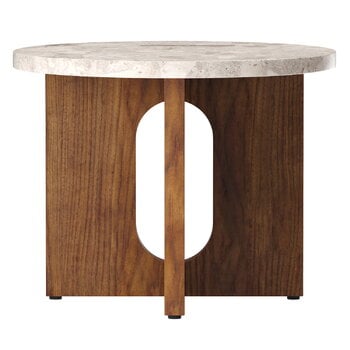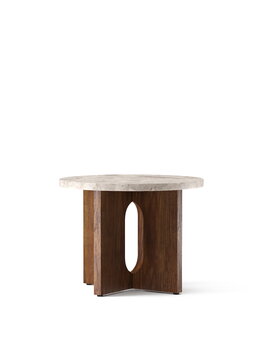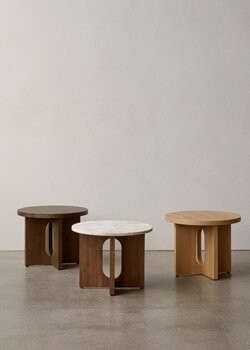Audo Copenhagen’s Androgyne side table is a charming combination of contrasting features. Crafted from walnut veneer and unique Kunis Breccia stone, the table plays with feminine and masculine elements, soft cuts and sharp edges, as well as simple and bold silhouettes. Danielle Siggerud designed the Androgyne table originally for the Menu Space Café in Copenhagen, and the stylish little table was quickly taken into larger production. Androgyne looks great in any space by an armchair, sofa, bed or window.
Androgyne side table, 50 cm, walnut - Kunis Breccia
Audo Copenhagen
Description
Audo Copenhagen’s Androgyne side table is a charming combination of contrasting features. Crafted from walnut veneer and unique Kunis Breccia stone, the table plays with feminine and masculine elements, soft cuts and sharp edges, as well as simple and bold silhouettes. Danielle Siggerud designed the Androgyne table originally for the Menu Space Café in Copenhagen, and the stylish little table was quickly taken into larger production. Androgyne looks great in any space by an armchair, sofa, bed or window.
Product details (6)
- Colour
- Walnut, sand
- Height
- 39 cm
- Diameter
- 50 cm
- Table top material
- Kunis Breccia stone
- Base material
- MDF, walnut veneer, steel
- Weight
- 15.5 kg
- Product ID
Designer
Danielle Siggerud is a Norwegian-born architect and designer based in Copenhagen. A graduate from the Danish Royal Academy of Fine Arts, Siggerud worked in London with the renowned architect John Pawson before opening her own studio in Copenhagen in 2016. In her work, Siggerud aims at eliminating all excess, focusing on details and choosing the right materials carefully.
View all productsReviews (0)
Sustainability
The Product Sustainability Framework, our criteria of sustainable design, helps you find the most sustainable products in our selection. Read below which sustainability criteria this product has met.
Working conditions & labour 7/9
-
Equal opportunities for all employees
-
Commitment to UN Global Compact, fair compensation for all employees
-
Corporate responsibility requirements defined and communicated for suppliers
-
Systematic work for improved inclusion and well-being in the workplace
-
Transparent supply chain
-
Suppliers' compliance to a code of conduct ensured
-
Compliance to the UN Guiding Principles on Business and Human Rights ensured in the supply chain
-
Direct suppliers audited and certified
-
Support for community involvement in the supply chain
Eco-friendly production 8/9
-
Fair and resource-wise water-use in production
-
No incineration or landfilling of returned items
-
No use of endangered species as materials
-
No direct environmental emissions or waste (excl. GHGs) from production
-
The sustainability of direct suppliers' production is addressed and monitored
-
Production and material sourcing that respect biodiversity, animal rights, and natural ecosystems
-
Material-efficient and ecological packaging
-
No potentially harmful chemicals used in own production
-
Positive impact on nature’s well-being through operations that regenerate natural ecosystems
Climate impact 4/8
-
Company's direct greenhouse gas emissions identified and commitment to reduction
-
Product's carbon impact identified and commitment to reduction
-
Guidance on energy- and eco-efficient use of the product
-
Carbon footprint of the product calculated and goals set to reduce it
-
Contribution to climate initiatives beyond the brand’s direct operations
-
Low-carbon or compensated transportation
-
100 % renewable energy in own production and operations
-
Carbon neutral or carbon negative product
Sustainable materials 6/6
-
Sustainable and long-lasting material choices
-
No harmful or hazardous substances
-
Responsible raw material sourcing and production
-
Materials suited for circularity: monomaterials, recyclable finishings, renewable or recycled contents etc.
-
Ecological materials: natural, biodegradable, recyclable or recycled contents
-
Outstanding materials in terms of innovativeness, responsibility, sustainability and circularity: local production or sourcing, 100 % recycled content, C2C-certification etc.
Circular design 4/5
-
High aesthetic quality promoting long-term use of the product
-
Technically durable product design and material choices
-
Design for enduring life-long quality
-
Design and support for product maintenance, repair and upgradability
-
Innovative circular design solutions: circular service system, resale platform, remanufacturing, collection of used products, etc.












